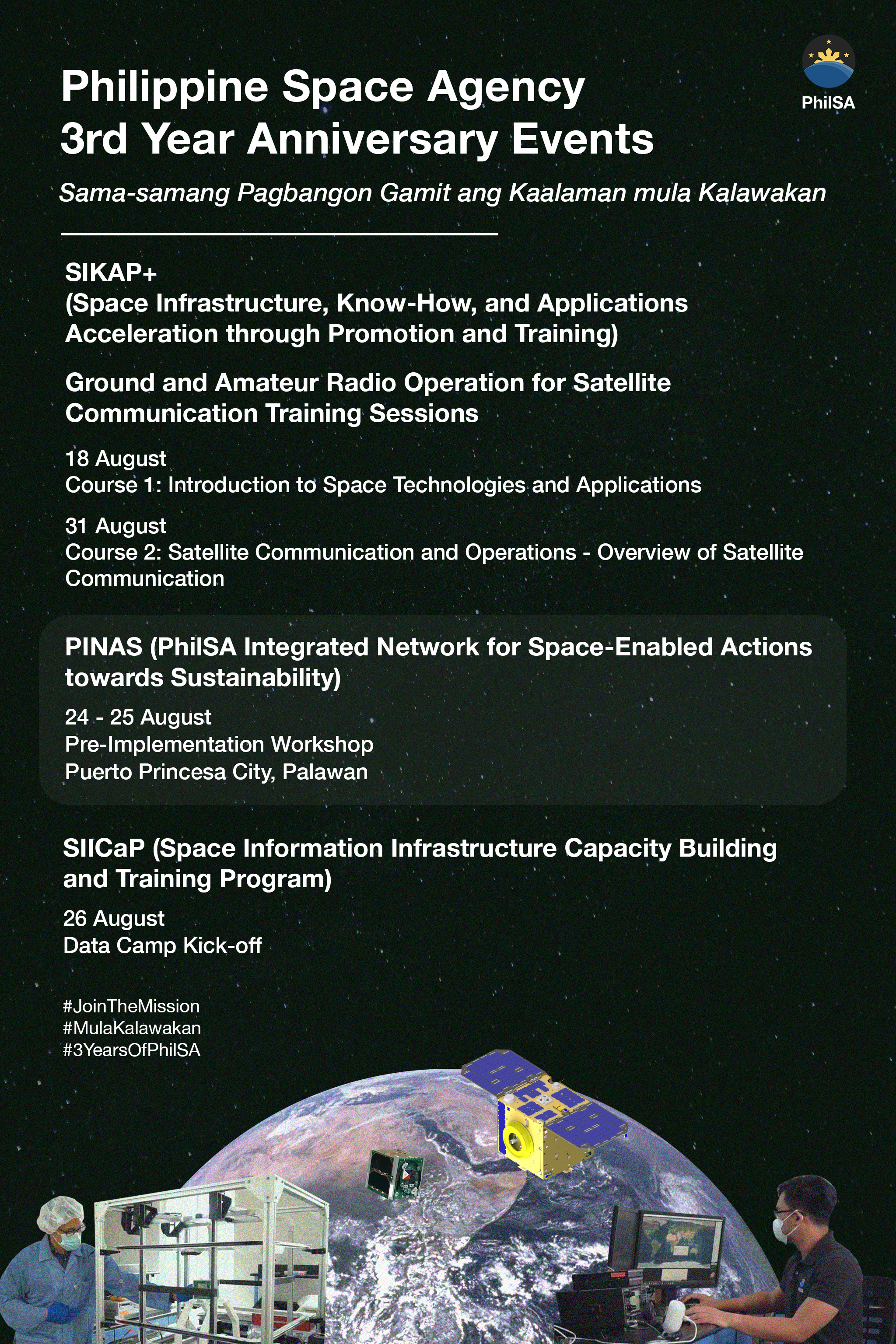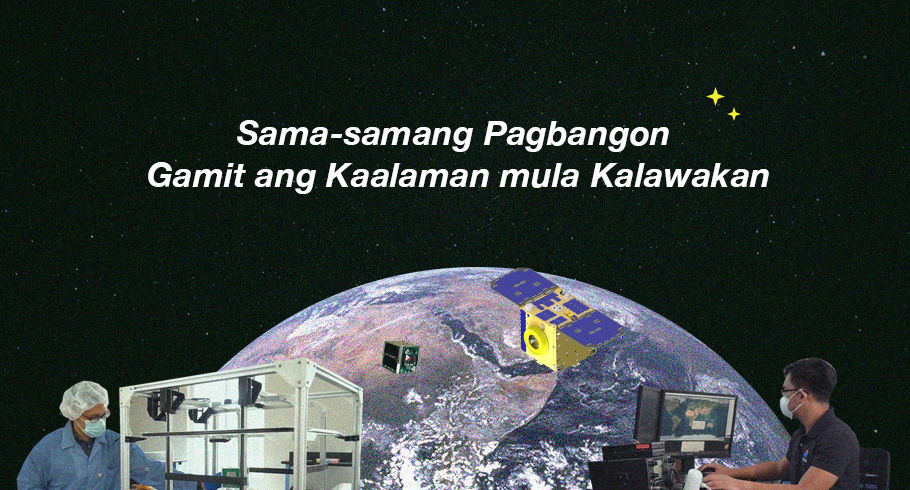The Philippine Space Agency (PhilSA) is marking its third anniversary this August with a month-long lineup of capacity-building activities. The celebration, themed Sama-samang Pagbangon Gamit ang Kaalaman Mula Kalawakan, will highlight the crucial role of end-users in harnessing information from space to benefit and empower communities.
PhilSA PINAS, or the Integrated Network for Space-Enabled Actions towards Sustainability will visit Palawan province for the second leg of the project’s pre-implementation workshops this August in Puerto Princesa city. The PINAS project envisions communities empowered through the utilization of the full value chain of space data; the project is designed to enable various sectors to sustainably access space data according to their needs. The workshop is set to invite representatives from LGUs, regional government agencies, non-government organizations, and the academe involved in sectors where space data would be valuable for policy making. “We will be inviting representatives from the agriculture, DRRM, environment conservation, planning, and national security sectors to introduce the potential of space-based technologies in aiding them in the fulfillment of their mandates and daily operations,” Ms. Jamaica Pangasinan, PINAS project leader and PhilSA SMCOD Senior Science Research Specialist said.
Meanwhile, the public will be invited to the launch and first installment of the five-part SIICaP Data Camp webinar also happening this month. Space Information Infrastructure Capacity Building and Training Program or SIICaP is a project under PhilSA ISKUELA (Inclusive SSTA Know-how, Utilization, Exchange, and Localization Activities). SIICap aims to promote and enhance understanding of space information infrastructures and their applications through monthly events. “The Data Camp will be the second series of SIICaP after Lakbay Kalawakan. It will now focus on how engineers and scientists use open source technologies to process geospatial datasets. Participants will get to learn these technologies through interactive lectures and will have the opportunity to use and showcase them in a culmination activity that will coincide with the World Space Week.” Engr. Cyrus Nikko Pante, SIICaP project leader and PhilSA Information Technology Officer I said.
Also happening this month is the Ground and Amateur Radio Operation for Satellite Communication Training Session of the Space Infrastructure, Know-How, and Applications Acceleration through Promotion and Training or SIKAP+, which was launched in May. The course is designed for satellite ground operators, amateur radio operators, and other interested participants from local institutions and the ASEAN region. It aims to equip the participants with knowledge and skills to use amateur radio kits for satellite and terrestrial communications. SIKAP+ project leader and Chief of PhilSA Space Mission Control and Operations Division (SMCOD) Ms. Shielo Muta said, “this project envisions to promote regional cooperation among neighboring Asian nations in satellite and ground station operations that will develop a more efficient and sustainable effort in maximizing the use of space infrastructures.”
The SIKAP+ project is made possible following PhilSA’s success in obtaining a €149,356.00 grant from the Trans-Eurasia Information Network Programme (TEIN*CC) of the Asi@connect Project funded by the European Union. The Asi@Connect Project interconnects universities and research centers in 24 economies/countries across the region by providing high-speed internet connectivity for research and education.
Announcements for registration to the public events will be made on the PhilSA official website and social media accounts.
Satellite development efforts continue
PhilSA continues to sustain the country’s satellite advancement program by engaging local private industries in developing the upstream sector. The Integrated Development of a Unified Standard 3U System, or InDUS3US project, is set to conduct this month a Qualification Status Review–an important milestone in the small satellite being developed by PhilSA with private companies in the country. Since May, PhilSA has been providing theoretical and hands-on training to engineers from space-adjacent industries. Through these activities, InDUS3US aims to jumpstart a space sector in the country to support future local space technology activities.
“InDUS3US will develop a 3U-sized cube satellite for Earth imaging to help with change and agricultural monitoring as well as disaster response management. But more importantly, this project provides first-hand experience to industry engineers as they work side by side with PhilSA engineers in this project,” InDUS3US Project Leader and PhilSA Spacecraft Mechanical and Autonomous Systems Development Division Chief Engr. John Leur Labrador said.
The activity is part of the 8-month training program facilitated by PhilSA satellite engineers, who completed a know-how transfer and training in the United Kingdom for the development of the Multispectral Unit for Land Assessment or MULA satellite.

About PhilSA
The Philippine Space Act, signed on 08 August 2021 created PhilSA as the central government agency addressing all national issues and activities related to space science and technology applications (SSTA). The Act mandates PhilSA to be the primary policy, planning, coordinating, implementing, and administrative entity of the Executive Branch of the government that will plan, develop, and promote the national space program. The Agency, directly attached to the Office of the President, facilitates the promulgation of executive and administrative orders and formulation of regulatory and legislative proposals on matters pertaining to SSTA development. PhilSA is headed by a Director General with the rank of a Cabinet Secretary, who also serves as the Presidential Adviser on Space Matters.
The Agency pursues the following Key Development Areas in SSTA: National Security and Development, Hazard Management and Climate Studies, Space Research and Development, Space Industry and Capacity Building, Space Education and Awareness, and International Cooperation.




